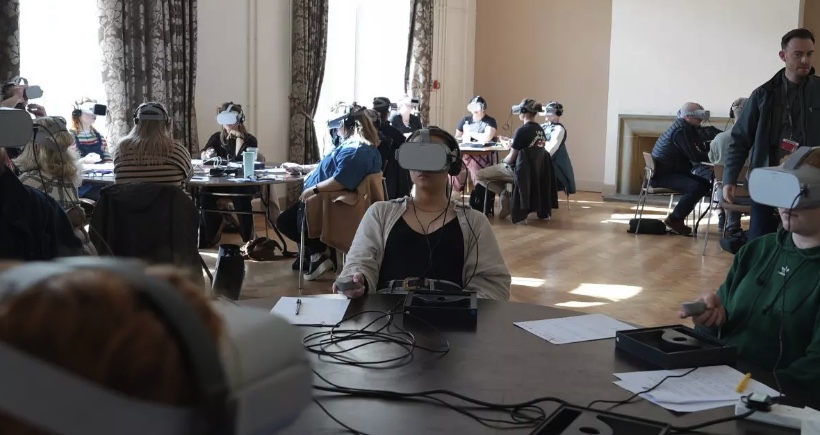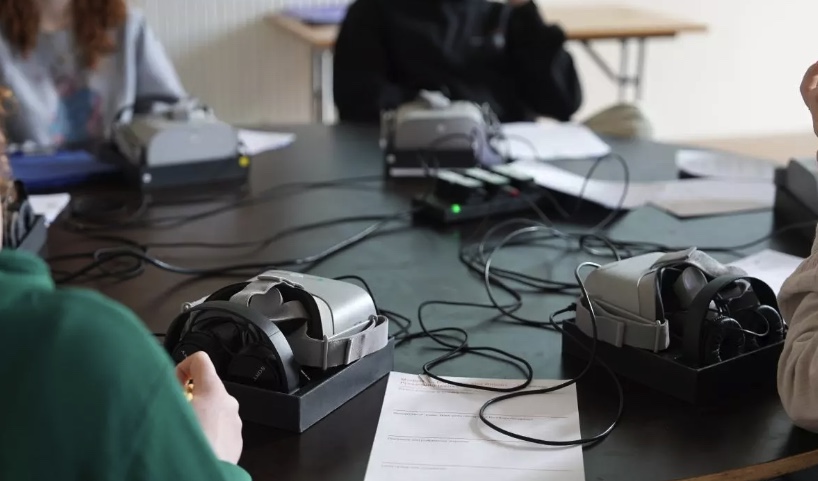North Wales university using VR to give students valuable insight into coercive control

Students of criminology, trainee police officers and social services professionals are gaining a valuable insight into the insidious nature of coercive control thanks to an innovative immersive training session using virtual reality (VR) headsets at Bangor University.
During the session, participants are placed directly in the shoes of victims of coercive control. They don VR headsets and enter a number of scenarios that illustrate the more subtle signs of coercive control.
But more importantly, they feel what it’s like to experience situations where “love bombing,” “gaslighting” and “stonewalling” are part of daily life.
Students virtually visit a reality where perpetrators take control of finances, mobile phones and medications, dictating what their victims wear, who they see and what they do day to day.
All students are thoroughly screened prior to the experience to ensure they are both physically and mentally prepared for what they will encounter.
According to the Office for National Statistics, there were 43,774 offences of coercive control recorded by the police in England and Wales (excluding Devon and Cornwall) in the year ending March 2023.
This is compared with 41,039 in the previous year, though the rise in coercive control offences over recent years may be attributed to improvements made by the police in recognising incidents and using the relevant law.

Dr Tim Holmes, subject lead for Criminology and Policing at Bangor University, said:
“We are pleased to be giving our criminology students an opportunity to experience this new form of training and are integrating it into our policing degree programmes for new police constables joining North Wales Police, at the request of the North Wales Police violence against women and children lead.”
“It demonstrates our commitment to responding to the need to improve new police officers’ awareness of coercive control, and how it can present itself in different forms.”
“This is something North Wales Police is keen to develop greater awareness of, and through the degree we have an opportunity to reach a lot of new police officers as well as criminology students and the wider social services sector with this training.”
Having an Impact
Jude Traharne, Managing Director of Mother Mountain Productions, the community interest organisation that facilitates the training sessions, said:
“It’s very exciting to be partnering with Bangor University and North Wales Police to deliver this training. Catching people at the beginning of their career, when they’re still training, is when we can have the greatest impact.”
“PowerPoint presentations aren’t always the most inspiring ways of training, particularly in a subject as sensitive and emotionally charged as this.”
“Our unique selling point is really to try and put people in the shoes of the other person, in this case a victim of domestic abuse and coercive control.”
“We work with agencies and survivors to ensure we are telling their story in the most authentic way possible, and to really make their voices heard, albeit anonymously.”
“We then film these scenarios with a 360-degree camera to create a virtual reality video that immerses participants in the training.”
“Through feedback and data we gather, we’ve found it really does impact on behaviour change. This type of training stays with participants and informs the way they approach victims of domestic violence and the questions they ask going forward.”
A Very Real Crime We Need to Understand and Try to Prevent Every Day
Claire McGrady, Inspector at North Wales Police and lead for violence against women and girls, added:
“What’s very exciting about this virtual reality training, which we’re doing for the first time in North Wales, is that it allows our trainee officers to learn more about controlling, coercive behaviour and take that knowledge back to the workplace and use it when faced with similar cases.”
“The statistics for this type of emotional abuse in England and Wales are in the tens of thousands, so this is a very real crime we need to understand and try to prevent every day. This training makes a great contribution towards that.”
A Fascinating Way to Learn
Reflecting on the training, criminology student Jasmine said: “I think it’s a fascinating way to learn. It’s really interesting to see the modules split up in the VR setting as well. Seeing it within a VR situation, you get more of a first-hand experience. It’s a cool way of learning.”
Latest News









